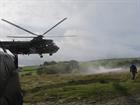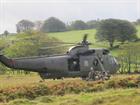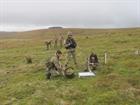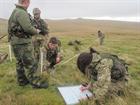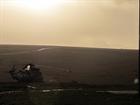848 NAS - Train Hard to Fight Easy
The Commando Helicopter Force enjoys a reputation for high standards of professionalism and flexibility and this is, in no small part, attributable to the exacting and thorough instruction provided by 848 Naval Air Squadron (NAS), or the ‘Junglie Training Academy’ as it is colloquially known.
Based at the Royal Naval Air Station (RNAS) Yeovilton the Squadron has a complement of one hundred and seventy personnel and is responsible for the instruction of up to fifty pilots and aircrewmen each year. Operating the Sea King Mk 4, pilots undertake and Aircraft Conversion Phase that includes learning to handle the aircraft including dealing with various emergencies and how to fly with sole reference to instruments - before crewing up with the aircrewmen, taken from Royal Navy Ratings and Royal Marines, to learn how to operate the aircraft in a tactical environment during the Operational Conversion Phase.
The Squadron also trains more than one hundred and fifty helicopter maintainers annually before sending them to the front line. Aircrew and maintainers receive military and amphibious training when individuals are taught how to operate in the field and from the deck of a ship. 848 NAS is also committed to numerous UK maritime operations and airborne support for the Royal Marines.
To ensure aircrew are fully prepared for future operations in Afghanistan, where elements of either 845 and 846 NAS are currently deployed, it essential the students are primed for the mountainous and high altitude environment, which is several thousand feet above sea level. Both squadrons continue to conduct very successful deployments in Afghanistan, operating their Sea King Mk 4 at the edge of their flight envelope with temperatures in the summer reaching 50 degrees and a sand ridden environment that challenges both aircrew and engineers alike.
Afghanistan was not a location originally envisaged for the North Sea anti-submarine Sea Kings on which the Mk 4 is based. In the knowledge that these challenges await anyone potentially joining a ‘Junglie Squadron’, 848 NAS continues their task of training both aircrew and support personnel to operate in both maritime and land environments.
During a wet and inhospitable week the aviators and engineers of 848 NAS were deployed to Oakhampton Camp on Dartmoor to further hone their flying and military skills. The vast space and austere environment of Dartmoor enabled the Squadron to establish a war fighting scenario working from a Main Operating Base could be established. The objective was to provide the trainee aircrew a taste of operating the aircraft in a stressful environment without the comfortable margins available at Yeovilton. For most of the trainee Engineers, this would be the first time they have serviced aircraft away from the well equipped hangars back at Yeovilton; they would also be rigorously tested on their Command Leadership and Management skills. Royal Marines from CHF were fully utilised to instruct on security and field skills and how to defend a full scale assault on a Forward Operating Base that had been hastily established forward of the MOB.
In 2009 a Sea Helicopter was hit by a Rocket Propelled Grenade. The aircraft was assessed as repairable and therefore had to be airlifted from the scene of the attack to its base at Camp Bastion. Prior to being airlifted the helicopter had to be stripped of many of its heavy components in an area occupied by the Taliban. Post Crash Management (PCM) was crucial in risk mitigation and field engineering was an essential aspect of the safe recovery and protection of the engineers carrying out the extremely challenging task. PCM is now a vital part of the training which the engineers would undertake at Okehampton.
Sorties in the hilly terrain concentrated the minds on the vital techniques of valley flying and approaches to pinnacles and ridges with the end result of dropping off troops or stores. This resulted in some epic flying for the students with the seasoned instructor in the left hand seat constantly pointing out all the potential pitfalls that await the unwary aviator.
The Okehampton detachment achieved all its aims and was an invaluable experience for the trainee aircrew and engineers alike who were able to enhance and prove their leadership skills beyond what is required on a day to day to day basis. Commenting on the training, 848 Squadron’s Senior Engineer, Lt Cdr Paul Barker added, "The week long Military Training Exercise has always been an important test for aircrew as they complete their Operational Conversion training, but it is also a great opportunity for the engineers on the squadron to demonstrate their leadership and professional aptitude in a challenging environment. The week was an overwhelming success bringing together aircrew and engineers to work as a highly motivated team and preserve the Junglie ethos."

